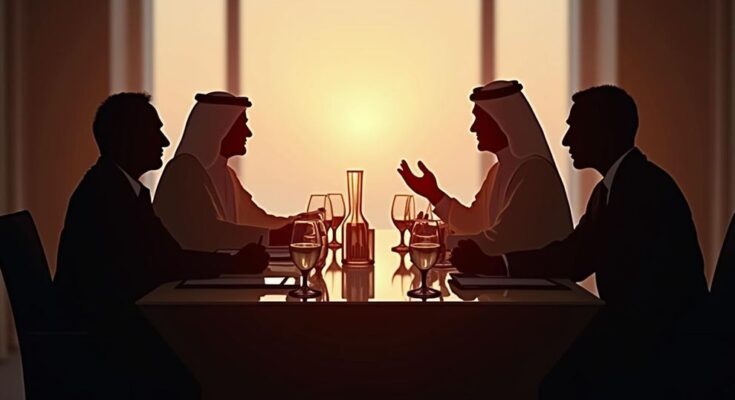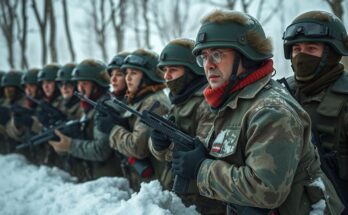On Saturday, Sheikh Mohammed bin Abdulrahman Al Thani met with French Foreign Minister Jean-Noël Barrot in Doha amid rising tensions in Lebanon and Gaza due to Israeli military actions. They discussed the urgent need for de-escalation and civilian protection. The meeting occurs as casualties in both regions continue to rise, with significant international focus on finding a political solution and halting arms sales connected to the conflict.
On Saturday, the Qatari Prime Minister and Minister of Foreign Affairs, Sheikh Mohammed bin Abdulrahman Al Thani, conducted a meeting with his French counterpart, Jean-Noël Barrot, in Doha. This diplomatic engagement arrives against the backdrop of escalating tensions in Lebanon and Gaza due to ongoing Israeli military operations. According to reports from the Qatari Foreign Ministry, the two officials deliberated on the critical situations in the Gaza Strip and the occupied Palestinian territories, alongside potential strategies for de-escalating violence in Lebanon. Barrot articulated the urgency for the cessation of hostilities and the protection of civilian lives during the discussions, highlighting Sheikh Mohammed’s crucial role in regional diplomacy aimed at mitigating the escalating conflict. Following a recent conversation with the Lebanese caretaker Prime Minister, Najib Mikati, and the Commander of the Lebanese Armed Forces, Joseph Aoun, Sheikh Mohammed reiterated Qatar’s solidarity with Lebanon and its commitment to ongoing assistance in the wake of heightened Israeli actions. Recent statistics reveal the tragic toll of violence, with the Lebanese Health Minister, Firas Abiad, reporting nearly 1,974 fatalities in Lebanon since the conflict’s escalation. Concurrently, the United Nations’ humanitarian office has recorded over 41,689 deaths and 96,625 injuries in Gaza resulting from continuous Israeli airstrikes, with the conflict nearing a grim anniversary of nearly one year. Barrot, who commenced his regional tour in Riyadh, acknowledged the potential for de-escalation during his statements and emphasized that a political resolution to the Middle Eastern crisis should be prioritized. His remarks align with those of French President Emmanuel Macron, who has advocated for a halt to arms sales related to the conflict and stressed the importance of peace negotiations. Macron asserted that France has not been involved in supplying arms to Israel, following criticisms from Amnesty International that urged the prohibition of military assistance to Israel. Barrot’s diplomatic journey will culminate with a visit to Israel on Monday, reflecting the ongoing regional engagements by France aiming to foster dialogue and mitigate conflict.
The diplomatic situation surrounding Lebanon and Gaza is characterized by heightened military operations by Israel, which have resulted in significant loss of life and humanitarian crises in both regions. As tensions escalate, numerous discussions among international leaders aim to address and alleviate these conflicts. Qatar has positioned itself as a key player, indicating a commitment to supporting Lebanon amidst these crises. Barrot’s regional tour indicates France’s active role in seeking a resolution and fostering a political dialogue, especially concerning arms sales and their implications on conflict. The involvement of world leaders such as Emmanuel Macron further underscores the geopolitical complexities and the need for cooperative international relations in mitigating violence.
The meeting between Qatari and French officials underscores the critical need for international dialogue amid ongoing violence in Lebanon and Gaza. As reported, the discussions stressed the urgency for a ceasefire and the protection of civilians affected by the conflict. Qatar’s commitment to supporting Lebanon, coupled with France’s advocacy for political solutions and halting arms sales, reflects a concerted effort by key international players to de-escalate tensions in the region. Continuing engagements among world leaders will be vital in fostering stability and ensuring humanitarian support for those affected by the conflict.
Original Source: dohanews.co




